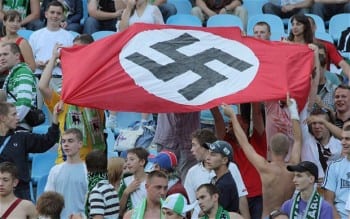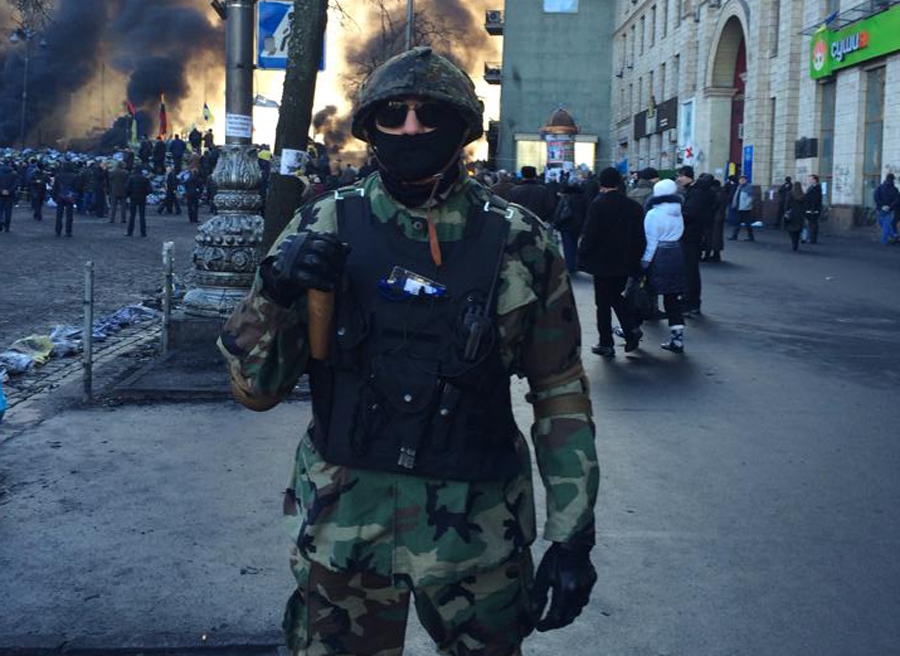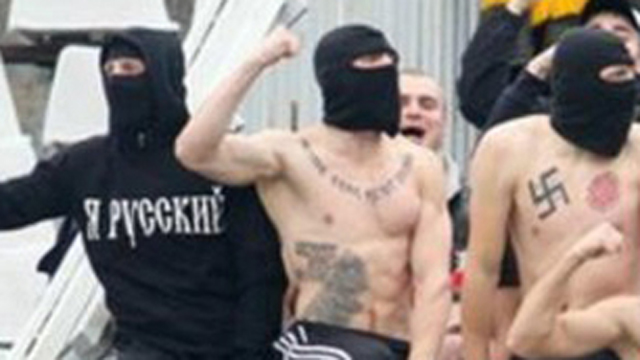Ukraine: the Enemy of Your Enemy is Not Always Your Friend
by ZOLTAN GROSSMAN

Pro-Russian demonstrators in Crimea denounce Fascists in Kiev regime. “Stop Assisting Fascists” read some of the signs.
To progressives who have been celebrating the revolution in Ukraine: Be careful what you wish for. Ukraine now has the first European government in decades in which outright fascist parties have gained a significant role in the executive branch. In other European countries, far-right parties have won seats in the parliament, but not secured real power in the cabinet. Of course, not all Ukrainian revolutionaries are fascists or Nazis. But it is equally wrong and irresponsible to assert that the presence of fascists and Nazis in the new government is merely Russian propaganda.
Fascists may be nasty brutes and suffer from bad manners but when it comes to a choice they are the capitalists’ natural class allies, their fallback muscle in times of social revolt. As far as the corporate elites are concerned, class is thicker than democratic principles.
When the far-right Freedom Party became part of Austria’s cabinet in 2000, the European Union issued sanctions against Vienna, and the New York Times was full of exposes of party leader Jörg Haider. But when the far-right Latvian National Alliance joined a conservative government in 2011, it was barely noticed in the Western media. And because the fascist party Svoboda (Freedom) and the Nazi shock troops of Pravy Sektor (Right Sector) played a vanguard role in Ukraine’s anti-Russian revolution, their role in the new revolutionary government has been glossed over in the Western media, with no serious exposes so far.

Neonazis topple Lenin statue.
So it may be controversial for far-right parties to join governments in the West, but it is permissible in the East if they are mainly opposing Russia. These same Western media commentators take any hint of criticisms of Israel as “anti-Semitic,” and then support a new government with parties that use World War II-era imagery, such as the Wolfsangel logo of Svoboda, and the White Power symbol of Odin’s Cross used by Pravy Sektor (ditto the Aryan Nations). The phrase “Never Again” takes on a hollow ring when the entry of real fascists into a government is minimized and excused.
Maidan revolution
Certainly the majority of protesters in Kiev’s Independence Square, or Maidan, were motivated to join by the massive corruption and oligarchical rule of Viktor Yanukovych, and particularly his unleashing of the brutal Berkut riot police. The Maidan protesters included backers of European Union integration, leftists (who question both Russia and the EU), ecologists, LGBT activists, and ethnic and religious minorities (including Jews and ethnic Russians). But Anti-Fascist Action Ukraine estimated that 30 percent of the protesters in Kiev were far-right ultranationalists, and that was before the shooting began, when more of them joined the street battles.
Although the Maidan protests have been depicted as “Pro-EU,” Svoboda has joined forces with far-right parties that are actually Anti-EU. It holds Observer status in the Alliance of European National Movements, which vehemently opposes the EU (including Jobbik in Hungary and the British National Party). Pravy Sektor’s key slogan has been “Against the Regime and [EU] integration.” Perhaps they both want to join the EU so they can later oppose it?
Much like Al Assad and Al Qaeda in Syria, Yanukovych and Ukrainian ultraright nationalists fed off each other, and actually needed each other to buttress their own legitimacy. Yanukovych’s brutality polarized the country, and reinforced the farthest right-wing factions of the nationalist opposition. Also like in Syria, moderate democratic groups were caught in the middle of the polarization, and lost significant ground to the better-trained militants. So you’d think that the toppling of Yanukovych would reduce the power of the fascists who had gained support by fighting him. But even before Vladimir Putin’s seizure of Crimea gave the ultranationalists new grist for the mill, their representatives were named to the new government in Kiev, led by the U.S.-backed Prime Minister Arseniy Yatsenyuk.
Svoboda

•
Svoboda leader Oleh Tyahnybok is well known for his comments that Ukraine is victimized by a “Muscovite/Jewish mafia,” and references to Jews as “Zhydam” (Kikes). One of his deputies established a “Joseph Goebbels Political Research Center” in 2005. The Centre for Eastern Studies in Warsaw commented in 2011 that “Svoboda’s success illustrates the growing demand of Ukrainian society for a new right-wing party with anti-democratic, xenophobic, pro-social and pro-family views.” Svoboda won only 10 percent in the October 2012 parliamentary election, and about 40 percent in parts of the heavily Ukrainian far-west. Yet last December, Tyahnybok was one of two opposition leaders visited and extolled by visiting Senator John McCain.

•
Since the revolution, Svoboda parliamentarian Oleksandr Sych has been named to the post of Vice Premier for Economic Affairs, and Svoboda has taken control of the ministries of education, agriculture, and the environment. Svoboda co-founder Andriy Parubiy was named Secretary of the Security and National Defense Committee, a significant post with control over police and military forces. Playing to a western audience, both Pravy Sektor and Svoboda have tried to reassure the Israeli ambassador that they are not anti-Semitic, and defenders of the Ukrainian Revolution have highlighted the very real anti-Semitism in Russian nationalist groups.
Two years ago, Svoboda led violent protests in Kiev against a new language law in Parliament, which allowed bilingualism in regions with more than a 10 percent non-Ukrainian population. Its first order of business in the new revolutionary parliament was to roll back the bilingualism law, which gave Putin one of his justifications to “defend” Crimea, where Russian-speakers make up a majority. A similar 2003 “democratic” revolution in Georgia installed a strongly nationalist government, which five years later moved militarily against ethnic secessionist enclaves, provoking a successful Russian invasion. But few such aggressive signs were seen in Crimea before Putin moved in.
Putin’s invasion of Crimea has relegitimized the ultraright in the eyes of many Ukrainian nationalists, and (not insignificantly) prevents about a million Crimean Russians from voting against Ukrainian nationalist parties in the next election. A pro-Putin biker gang that has supported his Crimea invasion, and pro-Russian rioters in eastern Ukraine, play as Russian “young tough” counterparts to the Ukrainian nationalists. Just as Svoboda uses Putin’s actions to frighten Ukrainians, Putin needs Svoboda to frighten Russians, and the polarization intensifies.
Proto-fascist mob in Ukraine.
Pravy Sektor
Pravy Sektor is even to the right of Svoboda, but that has not stopped its leader Dmytro Yarosh from being named as Paruby’s Deputy Secretary of National Security. Since the revolution, Pravy Sektor militants have begun tearing down statues of Soviet soldiers who liberated the republic from the Nazis. That’s because they are themselves Nazis, with a view of the world influenced not only by Ukrainian nationalism and German national-socialism, but by the global white supremacist movement.
Like Svoboda, Pravy Sektor looks back with fondness to the Ukrainian Insurgent Army (UPA), led by Stepan Bandera, who backed the 1941 German invasion of Ukraine. It soon became clear that Germany did not back his vision of a pro-Nazi Ukrainian puppet state–because Hitler viewed Slavs as subhuman, and coveted their fertile land for German settlers– so the UPA had to later defend itself from the Germans. But somehow you don’t really count as a resistance movement if you wanted to join the Nazis, but the other Nazis wouldn’t let you play.
In the meantime, the UPA was involved in massacres of Jews in parts of Nazi-occupied Poland now within western Ukraine. It also slaughtered at least 50,000 Catholic Poles who stood in the way of Bandera’s vision of a purely Ukrainian state. Far-right groups have recently backed the reburial (with honors) of members of the Galician Division of the Waffen SS, which also used the Wolfsangel symbol later adopted by Svoboda.
Last January, Svoboda led a huge Kiev rally marking Bandera’s birthday, and his portrait and uniforms were common sights in the Maidan protests. On one Nazi’s shield in Maidan could be seen the White Power symbol “14/88,” standing for the “14 Words” by David Lane of the U.S. terrorist group The Order (“We must secure the existence of our people and a future for white children”), and “88” for “HH” (“Heil Hitler”). Like other fascist groups in the region, the Ukrainian ultraright has also violently opposed LGBT rights, forcing the cancellation of the 2012 Kiev Gay Pride march.
In the Pravy Sektor video “The Great Ukrainian Reconquista,” ( Yarosh highlights many common Nazi themes, “against corrupt marginal democracy, against degeneration and totalitarian liberalism, for traditional national morality and family values, for large Ukrainian family, physically and spiritually healthy young people, against the cult of illicit gain and debauch[ery].” The video counterposes images of masked street fighters (with “Vikings” shields), and beautiful heterosexual couples, with Berkut riot police, Russian civilians, EU bureaucrats, and multiracial dancers. Another Pravy Sektor video shows different far-right factions marching, training, and fighting. These videos aren’t Russian propaganda about alleged fascists—they are the fascists’ own propaganda.
And by “fascist” I don’t loosely mean authoritarian conservatives, such as George W. Bush or the Koch Brothers. They may be right-wingers, but they uphold a global capitalist status quo with the U.S. at its center. Real fascists are extreme right-wing populist revolutionaries who want to overthrow the present system, and replace it with a dictatorship guaranteeing absolute rule by their own ethnic, racial, or religious group.
Fascists often sound like leftists in their opposition to corporate globalization and banks, NATO militarism, and environmental destruction, but have opposite motivations, usually revolving around racist and anti-Semitic conspiracy theories. (Some elements of the Tea Party–such as Glenn Beck and Rand Paul–do seem to straddle conservative and fascist ideologies.) Having experienced World War II, Europeans understand better that fascism is a specific political movement, and not just another way to say “meanie.” They are less likely to ignore a growing fascist threat when they see one.
Good Guys vs. Bad Guys?
U.S. media coverage of the Ukrainian Revolution tends to place it only in a West vs. East context, with the EU and NATO inherently good and Russia inherently evil. In this simplistic framing, the Ukrainian far-right is an inconvenient reminder that evil can emerge from the West as well, so it has to be minimized as Russian hyperbole.
Why is it that Americans of all political stripes–including progressives–can only see “good guys” and “bad guys” in a conflict, even in a situation that pits “bad guys” against “bad guys”? Maybe it’s our binary good vs. evil religious tradition, our “white hat” vs. “black hat” Hollywood films, or our two-party electoral system, which suppresses nuances and ignores other third-party alternatives. We want to view all protesters against oppressive regimes as “people power” heroes, without understand that today’s oppressed can (and do) become tomorrow’s oppressors.
As Yugoslavia broke up, all Western media attention was on ethnic cleansing by the Serbs, but almost never on the ethnic cleansing by the (U.S.-allied) Croatians or Kosovar Albanians. In Afghanistan, the Taliban oppressed Afghan women, but the U.S.-backed mujahedin warlords who had earlier ousted the pro-Soviet government were the first Afghan government to restrict women’s rights. In Libya and Syria, revolutions against secular Russian-backed dictators have likewise strengthened Islamist militias. The West’s double standards eventually work against its own interests, by generating “blowback” from the very monsters it helped to create.
The revolutions in Libya, Syria, and now Ukraine should show us that the enemy of your enemy is not always your friend. In a contest between Ukrainian and Russian ultranationalists, we do not need to pick sides. We can defend peace and the democratic rights of civilians, and all minorities on both sides of the divide, without contributing to the polarization and strengthening the rise of fascism. Two wrongs don’t make a right.
The next time you’re influenced by a facebook meme or a heart-wrenching youtube video about human rights violations by an “enemy” of the West, think about the atrocities by the pro-Western side that we are not seeing. Study the history of country, to learn that parts of the so-called “democratic” opposition today might draw their lineage to militant groups (such as the Ukrainian Insurgent Army or Venezuelan right-wing parties) that have massacred ethnic, religious, or political minorities in past decades. If the U.S. continues to back these crazies just because of they attack the West’s enemies, some kind of blowback is again going to be inevitable.
Dr. Zoltán Grossman is a political-cultural geographer who teaches at The Evergreen State College in Olympia, Washington. He earned his Ph.D. at the University of Wisconsin, focusing on topics of interethnic conflict and cooperation. He has taught courses on Central and Eastern Europe, and is a son of Hungarian immigrants. His faculty website is http://academic.evergreen.edu/g/grossmaz and email isgrossmaz@evergreen.edu









